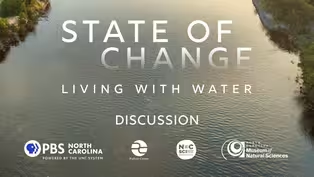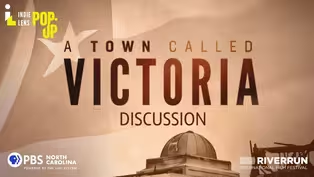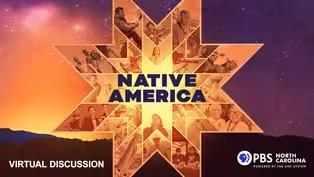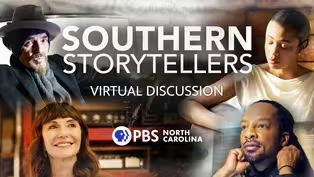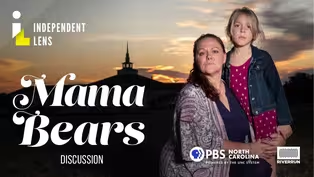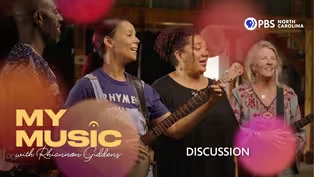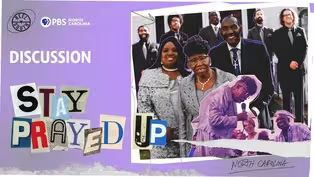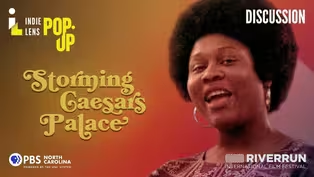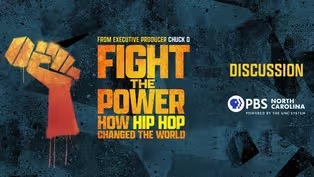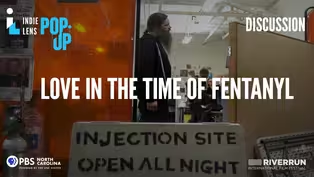PBS North Carolina Specials
Discussion | Independent Lens: Apart
2/1/2022 | 49m 51sVideo has Closed Captions
PBS NC hosts a discussion about formerly incarcerated women’s re-entry journey.
ncIMPACT host Anita Brown-Graham leads a conversation with Rick Glazier, North Carolina Justice Center, Deliah Montalvo, The Center for Women, Melissa Radcliff, Our Children’s Place of Coastal Horizons, Kristen Powers, Benevolence Farm and Katie Anderson, Second Chance Alamance Project. They discuss barriers to successful re-entry, unique programs and the effect of incarceration on children.
Problems playing video? | Closed Captioning Feedback
Problems playing video? | Closed Captioning Feedback
PBS North Carolina Specials is a local public television program presented by PBS NC
PBS North Carolina Specials
Discussion | Independent Lens: Apart
2/1/2022 | 49m 51sVideo has Closed Captions
ncIMPACT host Anita Brown-Graham leads a conversation with Rick Glazier, North Carolina Justice Center, Deliah Montalvo, The Center for Women, Melissa Radcliff, Our Children’s Place of Coastal Horizons, Kristen Powers, Benevolence Farm and Katie Anderson, Second Chance Alamance Project. They discuss barriers to successful re-entry, unique programs and the effect of incarceration on children.
Problems playing video? | Closed Captioning Feedback
How to Watch PBS North Carolina Specials
PBS North Carolina Specials is available to stream on pbs.org and the free PBS App, available on iPhone, Apple TV, Android TV, Android smartphones, Amazon Fire TV, Amazon Fire Tablet, Roku, Samsung Smart TV, and Vizio.
Providing Support for PBS.org
Learn Moreabout PBS online sponsorshipMore from This Collection
Recordings of previous virtual event discussions.
Discussion - State of Change: Living with Water
Video has Closed Captions
Panelists discuss resilient North Carolinians adapting to climate change. (28m 54s)
Discussion - A Town Called Victoria - Independent Lens
Video has Closed Captions
The filmmaker and former Victoria residents share their story. (46m 51s)
Discussion - Native America Season 2
Video has Closed Captions
Panelists discuss preserving the languages of Native American tribes. (39m 1s)
Video has Closed Captions
Sci NC executive producer and host, Frank Graff, chats about upcoming Season 6 of Sci NC. (26m 6s)
Discussion - Southern Storytellers
Video has Closed Captions
Author David Joy and others discuss storytelling and their new PBS series. (42m 13s)
Discussion - Mama Bears | Independent Lens
Video has Closed Captions
Producer and director Daresha Kyi discusses the film and LGBTQIA+ advocacy. (34m 41s)
Discussion - My Music with Rhiannon Giddens
Video has Closed Captions
Discussing the series with producers Will & Deni McIntyre and country artist Rissi Palmer. (39m 56s)
Discussion - Free Chol Soo Lee | Independent Lens
Video has Closed Captions
Local lawyers, professors and nonprofit leaders discuss wrongful convictions and reentry. (40m 44s)
Discussion - Stay Prayed Up, Reel South
Video has Closed Captions
The filmmakers discuss their journey with Mother Perry and The Branchettes. (45m 4s)
Discussion - Storming Caesars Palace | Independent Lens
Video has Closed Captions
Local professors and nonprofit leaders discuss welfare and the social safety net. (33m 2s)
Discussion - Fight the Power: How Hip Hop Changed the World
Video has Closed Captions
Local experts discuss the history of hip hop with PBS North Carolina. (59m 43s)
Discussion - Love in the Time of Fentanyl | Independent Lens
Video has Closed Captions
Local harm reductionists, therapists and others discuss the opioid crisis and more. (55m 44s)
Providing Support for PBS.org
Learn Moreabout PBS online sponsorship- Good evening, everyone.
I'm Anita Brown Graham, the host of the ncIMPACT Show, which airs on PBS North Carolina, each Friday at 7:30 p.m..
I'm also a professor of public law and government at the UNC School of Government, where I work on some of the very issues that have been highlighted in "Apart."
I cannot tell you how honored I am that PBS North Carolina invited me to lead this important discussion tonight, and I'm so thrilled that so many of you loved on to join us.
So here we are.
We've come together to discuss a really sensitive and important topic.
Formally incarcerated women, their reentry journey, the barriers they face, the relationships they navigate with their children and families, and so much more.
We need to be able to probe all of the related issues and provide a safe space for an open and informative community-driven discussion.
It's totally okay for us to agree to disagree on some of the issues.
In fact, it is healthy for us to disagree, but I wanna ask you at the outset to please be respectful as you enter your questions for this evening's panelists in the chat feature to the right of your screen.
So joining us this evening is an impressive group of local nonprofit leaders, experts, advocates.
Here with us tonight are Delilah Montalvo, Program Director of The Center for Women.
Kristen Powers, Executive Director of Benevolence Farm.
Rick Glazer, Executive Director of the North Carolina Justice Center.
Melissa Radcliff, Program Director of Our Children's Place of Coastal Horizons, and Katie Anderson, Project Manager of Second Chance Alamance Project, Benevolence Farm.
Welcome to all of you.
Thank you for being here.
Rick, I wanna start with you.
So from 1980 to 2019, the number of women incarcerated in state and federal prisons in the United States increased by a whopping 800%.
To put this in context, the number of women incarcerated went from 12,000 to 111,000.
Today in North Carolina, there are currently 2,104 women in prison.
Many people will say that much of the increase can be traced to the war on drugs.
Nobody is for drugs in our community, but I wonder whether you could give us some sense on what policy makers are thinking about in 2022 that might reverse the trends set in place in the 1980s.
And maybe more particularly, are there bills currently on the table in the legislature in North Carolina that amend small amount of possession charges and or related to sentencing?
- Thank you, Anita.
It's wonderful to be with you again, and for hosting this and moderating this incredibly important panel, following that emotionally draining and moving documentary.
- Indeed.
- You know, I think one of the other statistics that the documentary points out is 80% of the women who enter into the system are moms, they have children.
And so the incarceration of women on drug issues affects dynamically as this documentary showed, families and children and generations.
And I think people are finally understanding, we're making progress to move in a different way.
And there are bills pending over the last several years, particularly this is one of the few areas, frankly, where there's bipartisan movement, bipartisan learning and bipartisan understanding.
The Fair Chance Criminal Justice Project of the Justice Center is part of the Second Chance Alliance.
And we work with impacted populations, impacted people, congregations, advocacy, organizations, decision-makers, to reform state and local practices to create a better and fairer justice system, and particularly, those who are impacted by the justice system, everything from arrest to reentry.
And I'll highlight two bills for you to answer your question specifically.
Just sort of combination of bills that's occurred over the last several years is a dramatic change in North Carolina policy to increases expansions for people who have criminal convictions, and there's 1.6 million people with criminal convictions.
And to be able to do that, consistent with what many other states were doing.
To restore driver's license long revoked, which allows access to military, to jobs, to educational institutions that can't exist if your driver's license is revoked.
To improve occupational licensing for people who have convictions and those opportunities.
And that's a whole package of bills that's been worked on.
And in many respects, a significant start in passage of those bills in the last five years.
There was a bill directly related to how we treat women in penal institutions this past year, House Bill 608, which again was a bipartisan bill that passed, and its goal was to respond and to create respect, and dignity, and humanity for pregnant incarcerated individuals.
And it removed or significantly limited restraints during the second and third trimester, labor, delivery and postpartum, recovery, and ensured that women who are pregnant in institutions can get dietary supplements and nutrition during their pregnancy free of cost to the incarcerated individual.
And I guess the last thing I would point out is a bill that's pending that has [indistinct] And that is an understanding as we talk about the reentry process for women, is a bill that would move us into what's already a majority view, which is to stop banning SNAP benefits upon reentry.
That is supplemental nutritional assistance for women who have had drug felony conviction.
In some cases, that's a six month ban, in some cases, it's a permanent ban.
And it makes no sense as a public health matter, as a public power, as an economic matter, as a family matter, and we all talk family values.
And so we wanna remove and put us with the majority of the country that has gotten rid of that ban and said, getting nutritional assistance is one of the first safety nets that's needed for when someone is released from incarceration, and it particularly impacts women and their children.
- Thank you, Rick.
Delilah, let's go to you.
So going from the public policy perspective to the underground programmatic perspective, you are the program director at the Women's Center in Charlotte.
And as I understand it, the Women Center currently has about 30 women participating in a reentry program.
Walk us through what that looks like and the kinds of employment opportunities you're able to secure for your participants.
- Yeah, so as we stated, there's 2,110 females incarcerated in North Carolina.
We, you know, house 30.
30 of the females are actually incarcerated.
And when they get to the house, you know, it's a very organic holistic environment that we provide.
We're the prison that all prisons want to be.
You know, we provide safety, stability, the families get to visit.
As you saw in the film, you had children visiting these environments that were harsh and difficult.
So, you know, we provide an environment that is in a safe place for families to visit.
Within all of that, you know, all of this that we provide as far as the transition back out into the community, the workforce, it's important for them to become stable.
And then some of the jobs that they find in the community, you know, at the moment, it's difficult, right?
We have lawyers, we have folks that have worked as nurses, all types of, you know, professions.
And unfortunately they have to be brought to the food service, which, you know, nothing wrong with the food service, we need that, right?
We need those folks helping us, you know, serve us, but, you know, these are the humbling experiences that they have to come to terms with once they enter society again.
So yeah, there's many barriers when it comes to employment, you know, within the community.
I would hope that we could have a more forgiving community, but unfortunately, the population is stigmatized, and, you know, these women, they're moms, they're sisters, they're aunts, they're, you know, and most of all, like they're the backbone of the family.
And so we work hard to try to get them stable so that way they can go back to their families and, you know, thrive.
And so we try to provide that environment for them.
- Delilah, talk to me a little bit about what is the conversation with someone who may have been a lawyer or a nurse, or some other professional in trying to help them understand the path back?
- You know, it's a humbling experience for them.
You know, they come in thinking that they're able to kind of do the same things they did, you know, before incarceration.
And we allow them to navigate that for themselves for the most part, because they have to come to terms with what has happened in their lives on their own.
So after a while of a little bit of struggle with the community, as they go out there and try to find these professions that they're used to being in, you know, some of these conversations just surround, you know, we just surround them with hope and just tell them, look, they can rebuild their lives one day at a time, right?
Just get back out there.
Because routine is important, right?
We all have routine, and that's what we want to provide to them, and that's what I try to preach to them is just, you know, get back into the routine of life and everything else will fall into place eventually, right?
And some of the things that the center provides is that routine of waking up and, you know, cooking your own breakfast, and, you know, opening up the refrigerator, something that you can't do in prison, right?
All these little things that we take for granted, we provide that to them in this healthy environment.
- Yeah.
It's a journey, for sure.
Kristen.
Benevolence Farm.
Tell us how you got involved with this program, and then explain what it is and what are the services you provide.
- Yes, thank you.
So at Benevolence Farm, we're a nonprofit social enterprise in Alamance County, serving women across the state who come to our 13 acre farm where we do housing and employment.
And I came to this project kind of in a variety of ways.
I had previously worked at the Southern Coalition for Social Justice, doing a lot of different advocacy projects.
Also having grown up on a family farm in North Carolina, was gonna always looking for emerging of the two when somebody told me about Benevolence Farm about five years ago.
And so I really got invested in this organization because what I saw was this really powerful combination of direct services, advocacy, both serving the immediate need, as well as making those system changes long term to kinda get over that hurdle, that is reentry.
And at Benevolence Farm, we really wanna create what reentry can look like and what it should look like, and what resources women need.
And I am not formally incarcerated myself, I've had a loved one who is incarcerated, but we really try to take guidance and direction from the women in our program from formally incarcerated women, because they're the experts at this, and they really guide what we do.
We're super excited to have Katie Anderson on today, who's on day one at Benevolence Farm as a full-time staff member and former resident.
So she'll tell her story, but we really just try to invest fully and whole entirely in each individual.
And I think one of the quotes in the film was something about someone just being a number in the system, how they felt like they were a number, and at Benevolence, we really try to make sure people are recognized as the full human that they are and that nobody is the sum of their worst mistakes.
Whether you've been incarcerated or not, we've all messed up, and that we are here to invest in you as a person and meet basic needs that may have probably not been met prior to one's incarceration.
- Wonderful.
Katie, we're gonna come to you and give you a chance to tell your story, but I wanna stick with the issue of numbers for a second and turn to Melissa to just note.
You know, we heard the statistics in the film and we saw some heartbreaking examples representing those numbers.
This is a tough question, Melissa, but I'm wondering whether you can share with us what you see as the long term effects a mother's incarceration may have on her children, particularly young children.
- Well, thank you, Anita, and thanks to all of you for being part of this panel, and a big thanks to everyone who logged on this evening.
This was a tough film to watch.
Some of us watched it last week, and it's tough.
Took lots of notes about what really jumped out at me.
And, you know, the fact is that children are oftentimes part of what we call an invisible sentence.
I think women incarcerated in general is part of that invisible population, and then we add to that, the children, who oftentimes are just not even part of the conversation.
So to build on what Kristen said about numbers, you know, we can look at numbers, but the reality is we had a chance to see several children, who are not numbers, but children.
Their faces and their stories were part of this film.
And thinking about what they will experience going on, what the support is like for them now to hopefully counter what some of those impacts might be, but I think we also heard from the women, who said what their experiences were like growing up and what we were seeing intergenerationally, where they talked about that substance use was part of what they lived with, it surrounded them.
And so thinking about how do we counter that?
What does our community do to say, we get it.
You're surrounded by folks who love you, but are also struggling with substance use or mental health, or variety of other things, and we can help support to kind of counter that, that you can have some sense of, I don't have to be the next person.
One of the moms said, I want to send a message to my son that this is not what he has to do.
He does not have to follow in those footsteps.
I get a little bit nervous though, when we think about only the negatives, because the reality is these are three amazing women and three amazing moms.
And there probably are big pieces of those that we want their kids to follow in their footsteps.
So really understanding it, to build on what Kristen said, the whole person, and so there are probably pieces that we'd prefer kids not follow.
We don't want kids to get arrested and go to jail and serve a sentence, but also to recognize that parents have amazing pieces that we probably do want kids to follow in.
And so how do we help kids feel that support and say, Hey, this is the part of mom that makes sense and is hopeful and healthy for me to follow, but that I don't necessarily need to follow in some of these there ways that our family has gone now for multiple generations as several of the women talked about.
- So let me stick with you for a second, because one of the moments in the film that will probably stick with me for a while is the young girl who cried when she heard her mother was not in college, she was in jail.
And part of why I think it will stick with me is, it wasn't quite clear at her age why she would even know what being in jail might be.
So how are you thinking about disaggregating the realities of these very complex lives, where these are mothers who love their children and have so much to give, and yet they are incarcerated and that's part of the reality?
- Yeah, it's interesting.
I made myself a note about that as well, in terms of kids knowing the truth.
You know, I feel like kids know a truth, whether it's the truth or something that someone has told them, or pieces of a puzzle they've put together.
We feel very strongly that kids should know the truth about what's going on with their parents in a way that's age appropriate.
You know, what you tell a four year old is gonna be much different than what you tell a 14 year old, but to open the door for further conversations.
Because a concern is that children are going to find out the truth.
Bailey was lucky.
Her mom told her, but Bailey spends time with other kids, right?
And, you know, let's be honest, kids can be cruel at times, and I would just hate for the Baileys of the world to go to school one day or on the bus, or the playground, or after school and have someone say, your mom's not in college, your mom's not in the military, your mom hasn't died, she's in jail, she's in prison.
And so really thinking about then what that does to relationships with the person who told the child that and how that can, you know, we're picking up some pieces there as well.
So thinking about how families tell the truth.
And what I always say is, that is not a dig against families, families make decisions at the time, based on the best information they have.
We've put together some resources about telling a child the truth and how you would do that, how you would do it in a way, again, that's age appropriate so that you're not overwhelming a child, but that they have a better understanding of what's going on in that particular situation.
- Yeah.
Thank you.
So I encourage those of you who have questions to go ahead and put them in the chat box.
And Katie, of course, you've already been set up a bit by Kristen.
So tell us a little bit about your story, your incarceration, your reentry journey, and how you ended up now being employed with Second Chance Alamance Project.
- To be honest with you, I was just truly blessed.
I was incarcerated in the beginning of 2019 and was released in may of 2020.
So I did a little shy of a year and a half.
And when I was released, I didn't have any options of where I could go or I had to figure something out.
So I started putting in applications and COVID kind of messed me up a lot.
[Katie chuckles] And there were- You and everybody else.
Let's just be clear about that.
You and everybody.
- Well, it took a lot to get the representative at the prison to get in touch with Kristen, which was the person that was doing my interview for Benevolence Farm.
And we were finally able to get in contact and Kristen came and picked me up on May 27th of 2020.
I had a few hiccups over the year and a half.
I was the only resident, I think I'm still the only resident that reentered Benevolence for a second attempt at their program.
When I came back, I hustled really hard and got a job outside.
Benevolence was able to help me with wraparound services and they were able to help me get a house and get a car and get up on my feet and be stable.
And there was a long time that Kristen had been telling me that she wanted to be able to hire me on as staff member, but like the position just wasn't available for a while.
And this is the work that I have dedicated my life to.
You know, I'm trying to do exactly what everybody's done for me.
I just wanna help, just to help other people get on their feet.
That's it.
[chuckles] You're muted.
- Yep, that happens all the time.
[Katie laughs] Stop me if at any time my questions get too personal, but I'm curious.
Do you have children?
- I do.
So I have a relationship with two out of my four children.
My two oldest children were adopted by my mother, and then my two youngest children were adopted outside of the family.
Currently, I'm trying to take that back to court so I can get posted option, communication and connection.
That hasn't came available yet.
Right now I do have a pretty strong relationship with my two oldest childrens.
However, they still live with my mother.
We've explored different options, but as it stands right now, they're just gonna stay there and we're gonna have a good, like co-parenting relationship maybe.
- That's lovely and kudos to you for leaning in, reaching in and making sure they know you love them.
- That I do.
- Thank you.
I will continue with questions until I hear from Karen that there are other questions from the audience that I need to pursue, because, I don't know how to explain this, but I got a whole bunch of questions of my own.
So Rick, I wanna come back to you and follow up on my earlier question.
There's some policies and programs that have been implemented in the last decade that have been successful in lowering the overall population in prisons, particularly the population of men.
At the same time, 19 states, including Ohio, which was featured in tonight's film, "Apart" have seen the number of incarcerated women increase exponentially.
Can you talk a little bit about the trend in North Carolina?
- Yeah.
Well, the trend has changed a little bit because of COVID, right?
As you mentioned, we all have, but we have over the last several years reduced population inside the prisons, but we are starting at a high point relative to many other states.
The issue with women in prison, I think was highly documented in the film, and that is the vast majority are related to drug convictions, and the vast majority... And when we say that, they aren't necessarily all drug charges, they may be as the one case we saw was a robbery charge, but it's all interrelated to drug issues, and related to, in some cases, significant poverty or generational poverty issues that play in as well, and we saw that in at least two of the three women play out.
So in North Carolina, we are no different in those trends.
We are a state with a very sad history about incarcerating our citizens, relative to even other Southern states.
We have been slow to get to the expansion level.
We were the last state as you know, the last state in the union to put 16 and 17 year olds back into juvenile court from adult court, and the last in the country, and that was only several years ago.
So we are moving in the right direction, but it is starting from a very deep hole to build out of.
And I think that the issue with women in prison has been not dissimilar.
And I think it's finally dawn on folks on both sides of the aisle, that there is a lot of human waste and economic waste going on by the policies that we had in place.
And these three women's stories highlighted, every legislator ought to see this documentary, and to be able to relate, to stop looking at the numbers that we talked about and start looking at the people, and start looking at the children and the families.
There's certainly consequences that have to happen for all criminal activity, but we have relied for far too long in this state on incarceration as a major way of dealing with, particularly drug related charges.
And I would add, I guess, as I finish, Anita, one of the other things that's happened in this state that is a positive direction move is the increase in the number of drug treatment courts and specialized courts that understand and can really look more holistically at the problem that the reasons why someone made life choice decisions, and whether there are any less restrictive options than incarceration that will actually help that woman, that person, that family to move into a different path.
- Yeah.
So Rick, I wanna follow up on that last point, because one of our audience questions is whether there are efforts afoot to divert people from jail into programs, and I think the place where this seems most likely is where there is an issue of substance abuse, and I just wonder if you might just say a few words to describe for people who wouldn't otherwise know what a drug court does.
- Yeah, I mean, a drug court, and we have several specialized drug courts in different jurisdictions in the state, not nearly enough, and the drug court creates a special circumstance of judges that are specifically trained and then teams that look at the risk factors that got someone into a drug circumstance, what's available to help them out, and tries to create a very individualized program and sentence with accountability all the way through that deals with treatment, that deals with what got them on that path to begin with.
It's something other than a pure punishment or an incarcerative sentence, but the only way to do that is to understand the person as a whole, and to understand what got them there, and then to think about what plan can be put in place using community resources that can create an accountable way that still protects the community, but moves that person to a different path with chances, significant chances of not only what we would call rehabilitation, but a productive return to life and in a way that doesn't incarcerate them.
And that is the goal.
And drug treatment courts, the research is clear, drug treatment courts work across this country when sufficient resources are put into them.
- Thank you, Rick.
I appreciate that.
Kristen, I wanna turn to you for another question coming from the audience, which is, do you have any idea how many programs exist in North Carolina to support reentry into community?
And then once you answer that question, I wonder if you could help us think a little bit about your own program.
So obviously you have limited space, limited funding, limited resources.
If you aren't able to house women in the residential part of the farm, what are other options?
Is it feasible to have a day program or is the residential part really core to what you're doing?
- Yeah, thank you, Anita.
So Benevolence Farm is one of, unfortunately, just a handful of residential programs across the State of North Carolina.
We are part of a broader national network through Thistle Farms, which is in Tennessee as well as A New Way of Life, which is really kind of the inspiration model.
A former incarcerated woman named Susan Burton basically led the movement on housing women coming out of prison as someone who exited prison herself.
But this is just very much what we struggle with.
I mean, I think the, you know, for every person who's incarcerated in North Carolina, we spend over $30,000 per person per year by the State of North Carolina, the government, whereas an organization like ours is, you know, investing far less than that per individual.
And on top of that, employing people with a living wage.
And we're seeing a much better return to the community rate.
So of the 30 plus women that have gone through a residential program, 95% have remained in their community compared to the state average of 40% of people remaining in their community.
And so we know what we do works, and we know it actually doesn't cost that much money, but what it takes is that investment and that intention, furthermore to, I think what was not so much highlighted in the film, but think was referred to at times, was this overlap of women in the sex offender registry.
We could go on and on about what it means for somebody to be on the sex offender registry and how that system is really taken a far turn from what it originally was designed to do.
There's so many residential programs do not accept women on the registry, and so over 75% of the women we serve are actually on the registry now.
We are a farm so we're in the middle of the country and so we don't really have as many limitations as urban communities do, because actually... And I think new legislation just changed to make that even more difficult to find housing for someone who's on the registry, in especially urban communities in North Carolina.
So it is a massive struggle, but when we at Benevolence Farm, we don't have any conviction limitations, we don't have any length of incarceration limitations.
Basically, if you've been incarcerated, you identify as a woman, you can apply to the program.
And we do have limited space, and we do have to turn down a lot of folks for the program right now, and we are working on ways to try to expand how much we do with housing.
But one thing we've proposed even is a guaranteed housing program for women who are returning home.
We actually presented that here in Alamance County, as part of the conversation with the American Rescue Plan Act and the funds coming to local communities, and how even guaranteeing housing to women coming back for three to six months, where they can have that basic need met right away can give them the time and space to think about other access to resources, such as ID access, getting documentation paperwork together.
And we have done this kind of informally at Benevolence Farm and find that most of the women either remain in that housing or find additional stable housing within three to six months after that.
So it's very small kind of test that we're doing, but I think it is an interesting model that could be mirrored anywhere, because it does allow people the flexibility to live where they need to.
They could live close to their children, for example, if they wanted to, they could have their children.
And that's like, kind of, I think the last note I wanted to end on was one of the things that stood out to me was one of the women in the supportive, or who's returning home return to a recovery house that did not allow her children to visit or hang out with her or spend time with her, and at Benevolence, that's actually one of the first questions what many mothers will ask is, can I see my children when I'm at your program?
Which is just incredibly heartbreaking to know that some of these options make it really difficult to build that community and connection with their children, because we know that's such an indicator of success for reentry, both for women and their children.
So we, you know, try to enable those buildings of relationships as much as we can, whether it's hosting a birthday party at the farm or letting them come visit the chickens and show their family and kids the chickens that we have, or meet Rosie the farm dog.
But really it is also facilitating an open visitation policy offsite as well, because we'd love to have you at the farm, but really we know there's more intimate family conversations in the community happen at your grandma's house or your auntie's house, and so we are also try to be as flexible as possible, letting women also just, you know, be humans and be with their family as much as they can while they are at a residential program with us.
- I love that.
The chickens are everything.
[panelists chuckling] So Delilah, you have this really interesting background.
You were a former collection officer.
And so as we talk about the journey, I wonder whether you could just give us your perspective on where you saw women coming into the correctional system, in terms of behavior, attitude, mental state, and where you see the women who are now a part of the program you're engaged with.
- Yeah, so, you know, I've seen both of the spectrum, right?
I've been on the inside with them, locked away with them for 12 hours straight, no contact with my family.
I got to go home after 12 hours, but you know, that environment alone, it's depressing.
You know, it's hurry up and wait for everything.
It's an environment that suppresses them.
They're not allowed to be women.
And, you know, they are a number like they said in the film.
So being on the other side of it and working with them as they are transitioning out, it's just such an enlightening feeling to see that transition happen before my eyes.
They come in with these anxieties, 'cause prison is trauma, right?
They have this added trauma now of prison and it takes a lot of talk therapy, behavioral health therapists that we have on site to help them through these emotions.
And you know, after a while, when they get into the routine, 'cause I speak of routine lot, 'cause that is so important, I think for them, and they're thriving and they're living life, and they're in the community, and they're starting to make friends, and they're able to see their families in these safe environment that we provide them with.
It's so great to see them blossom and become the person that they've always wanted to be.
I preach to them all the time, you know, be creative, be someone different now, right?
We're providing you with this environment to now, you know, figure out who do you wanna be?
And that's what we do for them.
And prison doesn't do that, right?
It just suppresses people.
And you know, there's so much that has to change within the system when it comes to mental health, because that's where it starts, right?
And I just, you know, it was really difficult to watch that film.
It was difficult to watch that film.
It got to my heart, and yeah.
- Delilah, I am so with you.
It was hard for me to watch too.
I can't tell you that I didn't shed a tear or two, but these days tears are right there for me.
- Yeah.
- We're almost at time, and I wanna just give each of you an opportunity to maybe share an aspiration for the process.
So the thing that struck me like dead in my heart about the film was the recognition that somehow children are serving a sentence along with their mothers.
That's not what we mean to happen, but it's the reality.
And so as we think about this next generation of leaders in our communities, what do we do differently to support them?
And I'll stick with you, Delilah since you're up, but I'm gonna ask that question [radio interference drowns out speaker] - I'm sorry, you kind of cut off.
What was the question?
- What do we do differently to support these children of incarcerated mothers?
- You know, it's difficult to parent from the phone.
And so, you know, with our program, you know, we involve a behavioral health therapist to assist them through the process of reconnecting and, you know, the unification of their families.
And it takes lots of patience, and you know, lots of connection with the families.
It's an ongoing process.
It's not an overnight thing.
And I think that the community has to realize that that these women need time to connect with their children again, and that it's important for them to see their children, to be with their children in an environment that is conducive to that relationship.
- That's terrific.
Thank you.
Melissa, what are we gonna do to support these kids who have done no wrong?
- So I think we have two parallel, although intersecting paths that we need to be on, that our community has an obligation.
One is so much of what Rick talked about, like the changes that are in place, that need to be in place that are coming down so that we have...
I mean, the math is very simple.
The way to have fewer children of incarcerated parents is to have fewer incarcerated parents, right?
It's quite simple, even for folks who don't like math.
So let's keep on that path with making the changes about looking at drug court or other specialized treatment courts, and addressing the issues about why folks are in those situations, but that's not gonna happen today or this evening, or tomorrow.
So in the meantime, let's recognize that each of us in our communities have children of incarcerated parents.
They don't all live in those communities or those places, they're not in those school districts, they're in all of our communities.
So while we're making those changes that Rick and others are taking the leadership role on, let's also make sure our communities are saying, Hey, those kids we saw in that video, in that documentary, they're in our schools, they're our communities, our social services, our childcare centers, our afterschool programs.
What are we doing to support them?
Starting as simple as what language are we using?
- All right, I'm sending serious cyber hugs on that one for sure.
Kristen.
- Yeah, I'd echo a lot of what Melissa's saying.
I mean, we keep moms home, we keep parents home.
I mean, I think we have a convoluted, complicated definition of harm and violence in our communities and who's doing the harm and who's receiving harm and how sometimes that can be the same person.
And so I think we, you know, more globally need to have just a discussion about who is getting incarcerated and why, and is that truly helping our communities or the person harmed, or causing more harm?
Because that is like Delilah was saying, we always say at Benevolence, the one thing everyone definitely has in common that comes through our doors is a shared trauma of incarceration.
And in the short term too, we're all about meeting people's basic needs.
Like so many of the reasons we see people led to situations where they might be incarcerated is often 'cause they may be doing things that were for their children, like, you know, we've talked to women who stole bread or stole items from the grocery store for their kids because there was no systems in place to support them as parents trying to do their best on the outside.
So I think we also need to meet people where they're at right now and have that compassion, and have that awareness that we are really all just trying to do the best that we can, and how do we support one another to make sure we're not just surviving, but we are thriving in our communities as well.
- Thank you, Kristen, and thank you for all you do.
Rick.
- You know, I go back to this idea.
Over the last 30 or 40 years in sentencing in criminal courts, we've moved away from individualized sentencing, into grids and numbers and calculations.
There is some reason to have done that to create some sense of certainty and continuity, and equivalency, but we have taken away the humanity of each individualized sentencing hearing, and I think it is crucial to get back to that and to talk about when you're sentencing a woman, particularly in a nonviolent offense to an incarcerative term, you are sentencing her whole family, and you are creating ripples that you need to consider.
And I think, I would say if I had one tangible thing off tonight to do, it would be where you work, Anita to say the Institute of Government should use this documentary and other films like it in a really serious training of superior court judges to understand the consequences of what they're doing.
- Thank you, Rick.
And Katie, you get the last word.
- Personally, I would have to say that dealing with children that have incarcerated mothers and fathers, like we really need to be focusing on their mental health.
Like they're going through so much trauma and all of this grief, mommy's not there, daddy, who knows?
And this small child that had nothing, like their whole entire world was taken from them.
And then now they're at nana's house and they don't know how to behave, they don't know what's expected of them, they don't know how to do their homework because mommy sat down with them every day and did their homework and now mommy's gone, and there's just so much mental and emotional grief there that really I feel like that that's where if it was me personally, that's where I'd start.
- So I literally could have this conversation all night, but I wanna be respectful of everybody's time.
And so let me just say, first of all, many, many thanks to our special guests for joining us this evening and sharing their unique perspectives about this really important issue.
And then I wanna thank the audience for logging on and participating in the conversation.
There's so many other things you could have been doing with your Tuesday evening, but you chose to spend it focused on this issue with us on this evening, and for that, we are grateful.
On behalf of PBS North Carolina, I also wanna thank our event partner, RiverRun International Film Festival.
I'm feeling like that this is a big deal, like I have a different partner and their name is International Film Festival, but that's just me.
So please know that you can watch the entire broadcast length film, "Apart" on Monday, February 21st at 10:00 p.m. on PBS NC, you can also stream it on the PBS video app.
Invite all your family and friends, because really, this is an issue we should all be talking about.
And please be on the lookout in your inbox for an email early next week with the names, organizations, websites of tonight's panelists, some additional resources covering the topics featured in the film and in our conversation, a link to a discussion guide, how to volunteer or get involved, information about upcoming events and how to support PBS North Carolina.
Y'all, thanks again for joining us, and have a great evening.
Good night.
Support for PBS provided by:
PBS North Carolina Specials is a local public television program presented by PBS NC
